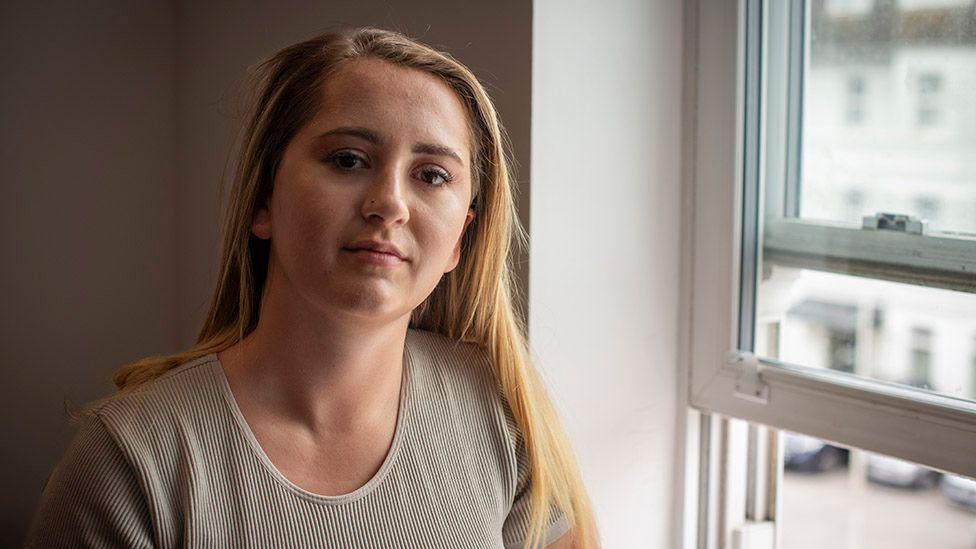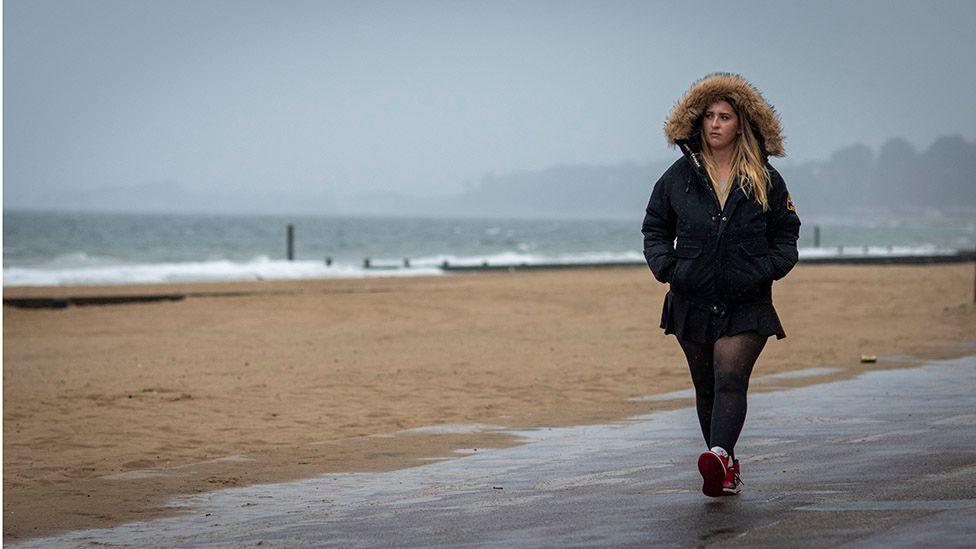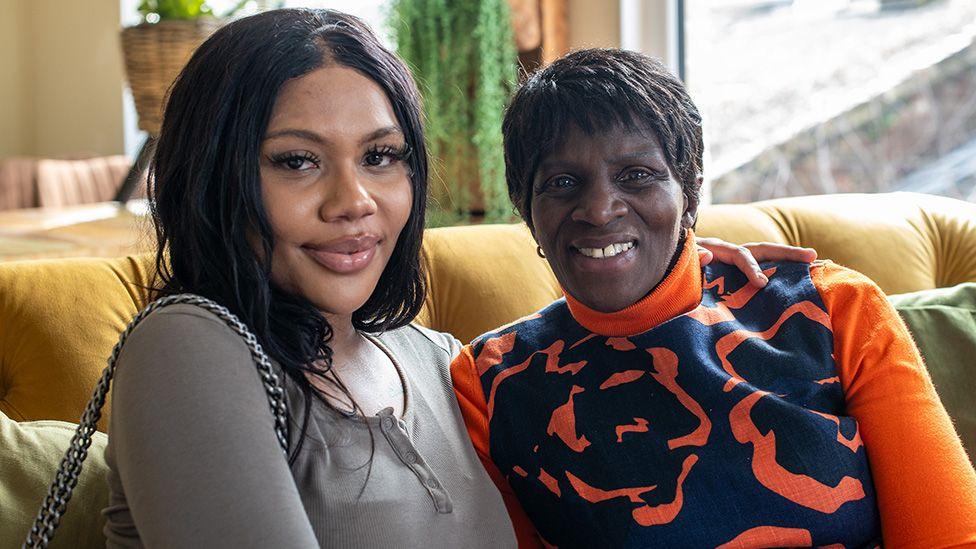Children detained under little-known orders are speaking out after turning 18

Katy Baxter was detained under a court order at the age of 14
- Published
At the age of 14, Katy Baxter was detained alone under a court order, far from her Bournemouth home, supervised by two workers 24 hours a day, going for long periods without any contact with her family.
“I wanted to see my nan and my sister. I couldn’t even call them because I wasn’t allowed a phone,” she tells the BBC. “It made me mad... angry.”
Katy, now 18, is one of thousands of children in England and Wales - at least one as young as seven - to have been placed under what are known as Deprivation of Liberty (DoL) orders.
The BBC has interviewed several young people who were subject to DoLs and are now speaking publicly about their experiences for the first time.
They told us stories of being cut off from their families, kept permanently under surveillance and subject to brutal - sometimes inappropriate - restraint.
All said the experience had had a detrimental impact on their long-term wellbeing.
A local authority can apply to the Family Court to impose a DoL order on a child if they are deemed to be at serious risk - either from themselves or others - and if depriving them of their liberty is seen as the only way they can be kept safe.
The measure is intended as a last resort when secure accommodation or placements are not immediately available.
A DoL order may be extremely restrictive. The child can be confined and kept under constant supervision by workers, who may be authorised to physically restrain them.
Many find themselves living in properties not designed for care, including temporary accommodation or even hotels, in unfamiliar locations. In the second half of 2022, the average DoL placement was more than 55 miles away from the child’s home, external.
Use of the orders - which has grown twelve-fold since 2018 - has been heavily criticised by England’s most senior family judge, who has told us the situation represented a “crisis”.
His concern is echoed by the children’s commissioner for England who says their impact has been “absolutely horrific” and a "national scandal”.

Katy says she was treated roughly by male workers
In her early teens, Katy was absconding from home and deemed to be at high risk of sexual exploitation. Her local authority at the time, Dorset Council, applied to the Family Division of the High Court for her to be placed under a DoL order.
The BBC gained permission to view and publish extracts from Katy’s court documents. The judgment set out the details of her restrictions. These were:
1:1 staff supervision at all times
No access to cash
No access to a phone or social media
No unsupervised use of the internet
Use of physical restraint strategies to reduce the risk of harm to herself or others in accordance with the Restraint Policies offered by [the care provider]
She would be held under DoL orders, across a range of care homes as far away as Bristol - miles from her home and family - for more than two years.
Although she was detained because of worries about sexual exploitation, Katy says she ended up being supervised mainly by male workers.
Katy recalls a disturbing incident from this time. She was having a shower, when a male worker knocked loudly on the bathroom door, demanding she come out.
“He then jumped on me. I was naked,” she says. “It made me angry… There’s nothing I could do about it.”
She also recalls an occasion where a worker grabbed and twisted her arm: “I thought he was going to break it.”
Katy says she is still traumatised by the memory.
Dorset Council has told us it takes Katy’s allegations very seriously and says it will investigate them thoroughly.

Zarha Codsi from east London was placed under a DoL order when she was 13.
It was the culmination of a traumatic childhood.
At the age of three, she was put into foster care after suffering severe neglect and sexual abuse.
By the time Zarha reached her teens, she had been placed in 14 foster homes - and had run away from several of them.

Zarha Codsi was placed under a DoL order at the age of 13
Her local authority - Tower Hamlets - applied for a DoL order on the grounds she was at high risk of involvement with gangs, drugs and child sexual exploitation.
The BBC has obtained the details of her order through the Family Court. Like Katy, Zarha had to be supervised by two workers around the clock, in accommodation in Bedfordshire. She was not allowed to have a mobile phone or unsupervised access to the internet.
The DoL order was only imposed for a week, but Zarha was then placed in secure accommodation in Glasgow for 10 months, 400 miles away from her London home. She says the impact was traumatic.
“I had friends who thought I had died because these people just took me away,” she says.
Like Katy, Zarha believes the restraint used by her workers was often unnecessary and inappropriate.
“If you said something slightly annoying, the workers could simply put their hands on you,” she says. “They could restrain you for the simple fact of crying.”

Detained and Restrained: Britain’s Vulnerable Kids
Ashley-John Baptiste investigates the increasing use of Deprivation of Liberty orders to deal with young people in the care system.
Listen on BBC Sounds or on File on 4 on Radio 4, Wednesday 22 May at 11:00

Zarha says it felt wrong that a teenager who had once been sexually assaulted could be restrained by two males, and that the restraints were not always about keeping her safe.
“Sometimes they would do it to overpower me and make me feel weak,” she says. “They never listened to me when I told them to stop.”
We contacted Tower Hamlets Council about Zarha’s treatment. It said this was the first time it had heard these “concerning allegations” and would welcome more information from her. The council also said it rarely used DoL orders and only when a child was extremely vulnerable.
Dame Rachel de Souza, the children’s commissioner for England, says she is concerned about the suitability of workers who supervise children on DoL orders.
Referring to them as “guards”, she says they are often untrained agency workers and not qualified social workers, lacking the therapeutic skills needed to support vulnerable children.
The use of DoL orders has risen dramatically in recent years.
Between April 2017 and April 2018, there were 102 applications to use DoLs in England, according to the Children and Family Court Advisory and Support Service (Cafcass). In the same 12 months across 2023-24, applications had risen to 1,234 - the majority of which were granted.
Experts say the use of these orders has also increased in Wales. The latest data from the Ministry of Justice, external shows there were 19 applications in the third quarter of 2023, rising to 23 in the fourth.
Scotland operates a different system, external to restrict the liberty of vulnerable children, and the use of restraint and seclusion is only allowed under very specific, regulated circumstances.
There is no data available for Northern Ireland where DoLs for children are rarely used.
The increase has been fuelled by the fact that many more young people with serious and very diverse needs are now entering the care system, according to John Pearce of the Association of Directors for Children’s Services (ADCS).
Some of these may have complex mental health problems and might previously have been treated at in-patient units. Others may be young offenders who in previous years might have been placed in custody.
While he welcomes the trend away from custody-based solutions, Mr Pearce says it has created a “vacuum” now being filled by DoL orders.
“We've been very good at looking at what we shouldn't be doing, but what we haven't done is look at what we should be doing,” he says.
Similar concerns have been voiced by the most senior Family Court judge in England, Sir Andrew McFarlane.
He says that every judge granting a DoL order feels uneasy “containing” a teenager from living a normal life and, in some instances, sending them to live far away from their home.
“It’s not infrequent for judges to be given just one option and told this is the only arrangement we can make,” he says. “And the judge feels compelled to make the order, because not to do so leaves the young person much more at risk.”

DoL orders represent a crisis, says Sir Andrew McFarlane, President of the Family Division, High Court
Paul Rhys-Taylor, who manages three residential care homes for boys in south London, believes DoLs prevent children from otherwise being exploited by “bad actors” - calling them a "necessary answer to a huge problem of young people going missing from their homes, be it within the family structure, or a foster home”.
However, concerns remain over the suitability of accommodation being used to house many young people under DoL orders.
About half of reported applications in 2022-23 were to place children in unregulated properties, according to the Nuffield Family Justice Observatory.
“We have seen applications to place children in holiday homes, Premier Inns. I’ve heard of two, I think, on canal boats,” says Sir Andrew.
He adds that there is concern from judges about how DoL orders might affect a child in later life - a fear echoed by Dame Rachel de Souza.
“What children tell me the most is, just how traumatising, depressing, isolating, and affecting it is to be put in this situation, and how long it takes to get over it,” she says.

The Children's Commissioner for England, Dame Rachel de Souza
Hamza (not his real name), a 17-year-old from London, told us about the ongoing effects of being placed under a DoL order.
He was 14 when he was detained after being found in possession of heroin and sent to a secure children’s home on the other side of the city.
“They did it to take me away from the older boys in my area,” he says.
Like Zarha, he was always supervised by two workers, including at school - something he describes as “embarrassing” and stressful.
Hamza soon stopped attending and did not take any GCSEs.
In all, he spent two and a half years in detention, including a nine-month spell in a young offender institution, an experience he says he preferred to the DoL order.
He is now living in supported accommodation, provided by his local authority.
“I am still stressed out,” he says. “I’ve become an extremely paranoid person because of the supervisions. Even when I don’t do anything wrong nowadays, I’m scared that someone is going to take me away.”
Meanwhile, Katy is living in temporary accommodation under the care of Dorset Council. She says the experience of the DoL order has led her to distrust men, and left her struggling to move on.
Zarha also dropped out of education. In court documents seen by the BBC, her social worker called Zarha’s experiences “upsetting” and “appalling”. She is now living in temporary accommodation in London.

Zarha now lives in London and receives emotional support from her friend, Verna
Dame Rachel de Souza says she is deeply concerned about the impact on teenagers’ happiness and self-esteem: “It often means the end of your education and your chances, and real, real deep trauma.”
When asked whether DoL orders were working when it came to long-term outcomes, John Pearce of the ADCS told us the answer was “almost certainly ‘no’”.
The government recently set up a panel of experts to look into the rise in DoL orders. Sir Andrew McFarlane says this has encouraged him to think the government is taking the issue seriously.
However, Dame Rachel - who sits on the panel - says she wants more radical thinking about alternatives.
“If you're going to deprive a child of their liberty, you're talking about the most vulnerable children in our country and worthy of our support,” she says. “How we treat the most vulnerable is such a sign of what we think about childhood.”
Correction: An earlier version of this article stated an incorrect duration for Zarha’s placement in secure accommodation. This has been changed to the correct duration of 10 months
Additional reporting by Sanchia Berg and Phil Marzouk
Get in touch
Have you been affected by the issues raised in this story?